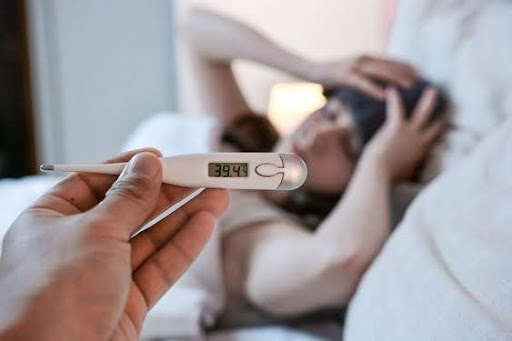Fever Profile Test:Causes and Symptoms

As the monsoon season arrives, it brings relief from the scorching heat but also increases the risk of various illnesses. Our bodies take time to adapt to the changing climate, making us more vulnerable to monsoon maladies. Malaria, dengue, typhoid, and other water-borne infections become prevalent during this time and can even be life-threatening. To ensure early detection and timely treatment, a screening check-up like a fever profile test is essential during the monsoon.
Table Of Content
What is a Fever Profile Test?
A fever profile test is a panel of blood works that aims to identify the underlying cause of persistent fever and common symptoms. It usually includes blood and urine tests to diagnose and determine the root causes of health issues such as malaria, dengue, tuberculosis, typhoid, or urinary tract infections (UTIs). Symptoms like headache, dizziness, chills, and sore eyes, along with fever, are signs that indicate the need for a fever screening. The results of the test help doctors recommend appropriate treatment, medication, and action plans to prevent the advancement of the disease.
When to Get a Fever Profile Test Done?
If you experience the following symptoms for more than two days, it is advisable to undergo a fever profile test:
- Severe body ache
- Diarrhoea
- Vomiting
- Loss of appetite
- Headache
How to Prepare for a Fever Profile Test at Home?
There is no specific preparation required before a fever profile test. However, it is important to inform your healthcare provider about any medications you are currently taking or have taken recently. In some cases, overnight fasting for 8-10 hours may be recommended, but drinking enough water to prevent dehydration is allowed.
What Type of Tests are Included in a Fever Profile Test?
A fever profile test may include multiple specific tests to provide a comprehensive evaluation. Here are some of the common blood works typically included in a fever panel:
- Complete hemogram (CBC, ESR)
- Dengue Antigen NS1, dengue IgG & IgM
- Typhoid IgM
- Peripheral smear for malaria
- Urine routine examination
- SGPT
- Aerobic Blood Culture
The test requires drawing about 4 ml of blood sample and 3 ml of blood serum through a needle in the veins. Additionally, around 10 ml of spot urine is collected in a container for analysis.
Is the Fever Profile Test Risky?
No, there are no risks or side effects associated with a fever profile test. It is a safe procedure that provides valuable insights into an individual's health condition.
- A high neutrophil count may indicate a bacterial infection.
- A high lymphocyte count may suggest a viral infection.
- A positive Widal test confirms the presence of typhoid fever.
- The presence of malarial parasites on a peripheral smear indicates a malaria infection.
- The results of urine routine and microscopic analysis indicate whether the fever is due to urinary tract infection (UTI) or not.
Frequently Asked Questions
When should I go for a fever profile test?
If you experience fever and chills accompanied by vomiting or diarrhoea and headache for more than two days, it is recommended to undergo a fever profile test.
Can I book a fever panel test at home?
Yes, booking a fever profile test is easy and hassle-free. You can schedule a slot based on the required tests. A trained phlebotomist will visit your home to collect blood and urine samples for analysis. Additionally, your temperature will be monitored. The collected samples will be taken to the lab for analysis, and the reports will be sent to you via mail or WhatsApp. If you have any concerns about the reports, you can seek a doctor's consultation.
What is a Widal blood test?
A Widal blood test is a serological test used to analyse typhoid fever. It identifies the presence of antibodies against the bacteria causing typhoid fever in the patient's blood
Do I need to test urine samples during fever?
Yes, testing urine samples during fever can provide valuable data for diagnosis and treatment.
Conclusion
A fever profile test plays a crucial role in diagnosing the root causes of persistent fever and common symptoms. By conducting blood and urine tests, doctors can identify illnesses like malaria, dengue, typhoid, and urinary tract infections. Early detection through a fever panel test and enables prompt treatment and recovery. If you experience symptoms such as severe body ache, diarrhoea, vomiting, loss of appetite, or headache for more than two days, it is advisable to undergo a fever profile test. Remember, timely diagnosis is key to effective treatment.





